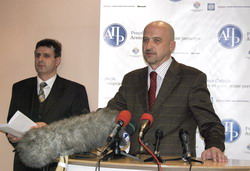- Serbia
Get to know Serbia
- Citizens
Culture and science
Health services
Pension and disability insurance
- Business
Employment
Economy
- Media
- Government
- Contact
Keep in touch
Contact form
Back
Keepin touch
Whether you have a question, comment, suggestion or any problem in the purview of the government, send us your message and we will try to respond as soon as possible. If your problem is not in our purview, we will forward your message to the relevant institution.
Q:
A:
Agency for Corporate Registries opened
Belgrade,
18 January 2005
Serbian Minister of Economy Predrag Bubalo said today that the work of the Agency for Corporate Registries will make the incorporation procedure cheaper and easier while reducing government involvement.
Bubalo said at the opening ceremony that the agency’s activities will remove one of the obstacles to the inflow of foreign capital and make it easier for Serbian workers who have lost jobs in the transition process to start their own private business.
He recalled that under previous regulations, it took an average of 72 days to register a company and that many domestic and foreign businesspeople had been pointing to this complicated procedure as an additional hindrance to the inflow of investment in the country.
The agency’s director, Dragan Okolisanov, said the agency will keep a single registry of companies, financial leasing, and security rights and that it will apply European practice and dislocate the registration procedure from commercial courts.
Okolisanov is hoping that the agency will create a significant database by the end of the year, thus giving insight to the true number of companies in Serbia as well as into their operations and financial power.
Swedish Ambassador to Serbia-Montenegro Lars-Goran Engfeldt said that the setting up of this agency is a big step in the transition process in Serbia and that the registry will help create a better business climate in the country and reduce corporate crime.
Head of the World Bank’s Belgrade office, Carolyn Jungr, said the improved incorporation procedure should encourage the development of the private sector, boost employment, strengthen competitiveness, and help the government and the ministries in the creation of corporate policies.
The agency was realised with the support of the Swedish government providing €1.4 million through its SIDA agency, the US Agency for International Development (USAID), which provided computers and equipment, and Microsoft, which has donated software.
The total value of the project was about €1,7 million and its founding was backed by the Serbian government.
He recalled that under previous regulations, it took an average of 72 days to register a company and that many domestic and foreign businesspeople had been pointing to this complicated procedure as an additional hindrance to the inflow of investment in the country.
The agency’s director, Dragan Okolisanov, said the agency will keep a single registry of companies, financial leasing, and security rights and that it will apply European practice and dislocate the registration procedure from commercial courts.
Okolisanov is hoping that the agency will create a significant database by the end of the year, thus giving insight to the true number of companies in Serbia as well as into their operations and financial power.
Swedish Ambassador to Serbia-Montenegro Lars-Goran Engfeldt said that the setting up of this agency is a big step in the transition process in Serbia and that the registry will help create a better business climate in the country and reduce corporate crime.
Head of the World Bank’s Belgrade office, Carolyn Jungr, said the improved incorporation procedure should encourage the development of the private sector, boost employment, strengthen competitiveness, and help the government and the ministries in the creation of corporate policies.
The agency was realised with the support of the Swedish government providing €1.4 million through its SIDA agency, the US Agency for International Development (USAID), which provided computers and equipment, and Microsoft, which has donated software.
The total value of the project was about €1,7 million and its founding was backed by the Serbian government.
-
 Požarevac, 21 August 2025
Požarevac, 21 August 2025Sports, educational camp in Požarevac gathers 150 children, young people from diaspora
-
 Belgrade, 21 August 2025
Belgrade, 21 August 2025Development of cooperation with Germany in areas of mutual interest
-
 Belgrade, 20 August 2025
Belgrade, 20 August 2025Importance of continued progress in reform processes
-
 Belgrade, 20 August 2025
Belgrade, 20 August 2025Starović speaks with Australian Ambassador
-
 Belgrade, 20 August 2025
Belgrade, 20 August 2025Close cooperation between Serbia, Türkiye for benefit of citizens of both countries
-
 Belgrade, 19 August 2025
Belgrade, 19 August 2025Potential for improving cooperation with Japan
-
 Belgrade, 15 August 2025
Belgrade, 15 August 2025Joint action of all services, farmers to protect livestock
-
 Belgrade/Marsaskala, 11 August 2025
Belgrade/Marsaskala, 11 August 2025Monument to Milunka Savić, young Serbian officers unveiled
-
 Belgrade, 8 August 2025
Belgrade, 8 August 2025Continued support for UNMIK engagement within existing framework



